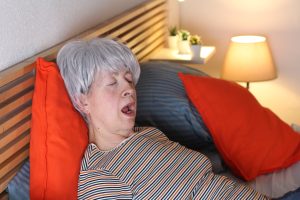
Since the incidence of obstructive sleep apnea (OSA) has been found to increase through menopause, it has been suggested that it could be caused by a decrease in the level of sex steroids. This hypothesis comes from previous research that shows how hormone therapy can reduce the incidence of sleep apnea. Postmenopausal women are also more likely to experience musculoskeletal joint pain during and after menopause, which is another problem that is linked to hormone changes.
Sleep apnea is a disorder that is a risk factor linked to hypertension and diabetes, contributing to the progression of cardiovascular disease. Due to the severity of these risk factors, health care professionals are making an effort to decrease factors that may contribute to this disorder.
Previous studies showed that the severity of hot flashes could be associated with the risk of sleep apnea in middle-aged women. Although this study reached this conclusion, the relationship between other symptoms common to middle-aged women who suffer from sleep apnea is still not fully understood.
This new study suggests a significant association between sleep apnea and joint pain. Researchers believe that joint tissues have estrogen receptors, and estrogen plays a role in maintaining the homeostasis of articular tissues such as ligaments, cartilage, and muscles. Additionally, more extensive studies are needed to verify and expand these findings.
Dr. Stephanie Faubion, author of the study, explained, “This study highlights an opportunity to increase identification of women with OSA, which is underdiagnosed in women who often present with vague symptoms such as insomnia, fatigue, and morning headaches. According to these findings, joint pain may be another symptom that should prompt consideration of a diagnosis of OSA in women.”
Getting A Good Night’s Sleep
A lack of sleep can cause more than just tiredness and diminished performance. A poor night’s sleep can affect healthy body weight, blood sugar levels, cardiovascular health, and mood. It can have an overall devastating impact on your health.
Due to today’s fast-paced lifestyles and stress, numerous factors can affect getting a good night’s sleep. Sleep Sure Plus is designed to help promote optimal restfulness and sleep period by using a variety of ingredients. This doctor-formulated combination of ingredients includes melatonin and valerian, some of the best natural ingredients for promoting rest and relaxation.
As this study has outlined, poor sleep may be associated with joint pain severity. As you age, it is vital to maintain healthy joints to help reduce pain and stiffness. Pain Easer is a topical solution that can help to temporarily ease pain and discomfort on contact.
With a variety of ingredients, including camphor, a proven natural pain reliever, this easy-to-apply spray makes it convenient to get fast-acting relief. If you have sore, aching joints, don’t suffer any longer. Get a good night’s sleep and apply Pain Eraser!